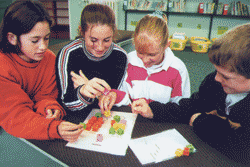|
FOCUS / FORUM
INDEX
|
 |
In 2008, the Forum Comment,
was relaunched as the Focus
reflecting the closer comment from
NEMP and the panel of educators. |
 |
|
Main Index for Focus / Forum
Introduction
to Focus / Forum
He
Whakaputanga Whakaaro –
Introduction for Mäori
Medium forums
|
| Forums by year of assessment |
|
|
|
Science
Art
Graphs, Tables & Maps
|
|
|
|
Music
Aspects of Technology
Reading & Speaking |
|
|
|
Information
Skills
Social Studies
Mathematics |
|
 |
|
Listening
& Viewing
Health & Phys. Ed.
Writing |
|
| Forums for Mäori Medium |
|
|
|
Science
Art
Graphs, Tables & Maps
|
|
|
|
Music
Aspects of Technology
Reading & Speaking |
|
|
|
Information
Skills
Social Studies
Mathematics |
|
 |
|
Listening
& Viewing
Health & Phys. Ed.
Writing |
|
|
|
|
|
 |
|
 |
|
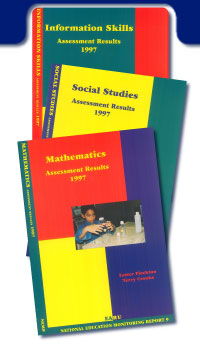
CLICK
on reports above to go directly
to comments |
|
|
The three reports on the 1997 assessment results were considered
by a national forum of curriculum and assessment specialists,
principals, teachers, advisers and representatives of
national educational organisations. Their comments highlight
what students are generally doing well, and those areas
where improvements are desirable.
| FORUM
PARTICIPANTS |
National
Advisory Committee
Sandie Aiken
Jacky Burgon
Peter Corrigan
Warwick Elley
Val Fergusson
Alison Gilmore
Terry Hewetson
James Irving
Ian Livingstone
Grant McMillan
Denise Ongley
Jim Strachan
Neil Reid
Lynne Whitney
Marilyn Yeoman
|
Social
Studies AdvisoryPanel
Sandra Cubitt
Alison Dow
Raewyn Gregory
Teremoana Hodges
Heather Shepherd
Information Skills
Advisory Panel
Edith Curwood
Andrea Barr
Gwen Gawith
Pippa Young
Mathematics Advisory
Panel
Fred Biddulph
Barry Brooker
Dan Murphy
|
Mäori
Reference Group
Raiha Boyes
Liz Patara
Gloria Takuira
Teacher Administrators
Kathy Ferguson
Janice Gulbransen
Sue Nevezie
Jacqui Patuawa
Wiremu Rankin
Mike Young
Also
Hohepa Campbell
Chris Davidson
Raewyn Growther |
|
 Click
the Access Task for more information about
those tasks Click
the Access Task for more information about
those tasks
which are available to schools. |
|
|
|
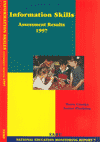 CLICK for
full report CLICK for
full report
|
GOOD
NEWS
The overall attitude of students towards Information
skills was positive as evidenced by the NEMP survey.
They enjoyed the tasks and most were interested in
gathering information.
Students knew and were confident about where to locate
information from catalogues and reference books.
The majority of year 8 students had considerable success
on alphabetical ordering tasks.
|
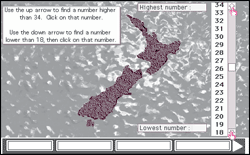 Student
progress from year 4 to year 8 was substantial — particularly
in locating information. Student
progress from year 4 to year 8 was substantial — particularly
in locating information.
Students can locate relevant information when text is well
organised and explicit.
Where students had background knowledge on a topic, they
found it easier to ask relevant questions. This was particularly
evident on computer-based information finding tasks.
|
 |
CONCERNS
As indicated in the summary on page 11 of the report, “The
most important message emerging from the framework is that
students possessing well developed information skills can perform
three main tasks effectively: clarifying information needs
and formulating good questions, finding and gathering information
that is relevant to the questions, and then analysing and use
that information to answer the questions. A substantial proportion
of the intellectual demands occur during the first and third
of these tasks: finding information is clearly important, but
its value is greatly dependent on the extent to which it can
be validly interpreted and used to answer important questions.”
Student performance indicates that there needs to be more emphasis
for teacher development on these key areas:
a.
defining information need and asking contextualised
questions;
b. using the information analytically to answer questions.
Performance
on tasks requiring analysis and classification of information
suggests that students still need to bring thinking skills
to bear on such tasks.
Where students lacked background knowledge their ability
to ask appropriate and thoughtful questions was compromised.
There is a danger that teachers confuse students’ demonstrated
confidence with computers with their ability to retrieve
and analyse information.
Student perception of computers as the one stop shop for
information is not backed up by students’ ability to
retrieve and use information.
|
GENERAL
The study confirms the rationale (page 10 of report) that while
information skills are integral to all curriculum areas,
unless they are a conscious focus for teaching and monitoring,
they tend to slip between the cracks.
Information skills are described differently in each of the
curriculum statements. This NEMP report, and particularly the
framework on page 11, provides necessary coherence and an overview
which gives direction for teacher development and school planning.
If we are to develop students with adequate information literacy
skills, a summary chart of the essential skills, exemplified
by the NEMP framework, should be integral to the implementation
of each individual curriculum statement.

Girls
did better than boys on one third of the tasks. The high
relationship between socio-economic levels and achievement
was confirmed in this report.
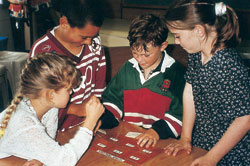
|
|
|
|
|
|
|
|
|
The
reports show that non-Mäori students performed better than
Mäori students on many tasks in the curriculum areas of mathematics,
social studies, and information skills.
The NEMP student survey showed that attitudes of Mäori students
to mathematics and social studies were generally more positive than
those of non-Mäori students.
Mäori students’ attitudes in mathematics, social studies
and information skills were especially positive at year 4. Mäori
students expressed confidence in their ability in mathematics and social
studies. In the area of information skills they are willing to gather
information voluntarily.
Mäori students performed well on tasks where they could relate
strongly to the contexts.

MATHEMATICS
Mäori students at year 8 were substantially more successful
than year 4 students on a number of tasks involving money, measurement
(length, area, volume, weight, time, temperature) and geometry.
SOCIAL STUDIES
Mäori students did significantly better than non-Mäori
on the marae task and did well at identifying features unique to
the Mäori culture. When working together in teams to formulate
rules, both year 4 and year 8 students performed well. A good percentage
of year 4 teams were able to offer appropriate strategies for dealing
with problems.
INFORMATION SKILLS
Mäori students at year 4 and year 8 achieved substantial success
with finding and gathering information. Like non-Mäori students,
they were less confident with clarifying, interpreting and using
information.

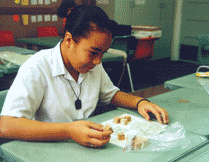
Comparisons between Mäori and non-Mäori achievement reveal
concerns. The substantial differences in performance evident at year
4 had not decreased by year 8, and had increased in social studies.
All stakeholders (government, teachers, parents and communities)
must share responsibility for the necessary planning, resourcing
and strategy needed to raise the achievement of Mäori students.
|
 |
| |
|
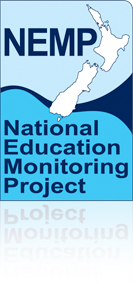


 Student
progress from year 4 to year 8 was substantial — particularly
in locating information.
Student
progress from year 4 to year 8 was substantial — particularly
in locating information. 

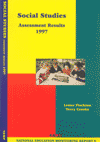

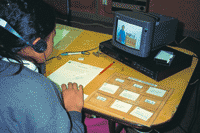 GENERAL
GENERAL

 GENERAL
GENERAL